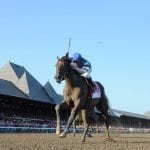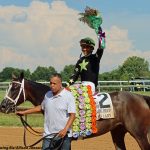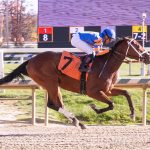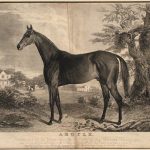Delaware Handicap has had major impact on racing history
On Saturday, July 8 the 86th running of the Delaware Handicap will take place at Delaware Park. Old-timers will recall that in the glory days, the race was the premier contest in the United States for fillies and mares. As the longtime local racing analyst and historian Rich Glazier was fond of reminding his audience, there was once a maxim known throughout the thoroughbred world; “If you have a filly or mare, send her to Delaware.”
Times change, however, and like the venue itself the race has had ups and downs in the nearly nine decades of its existence.
Fittingly, the very first running of the race was won by Rosenna, who was owned by Mr. William Du Pont Jr., the founder, developer and designer of Delaware Park. In that initial year and for the subsequent 12 years, the race was held at a distance of 1 1/16 miles.
Originally known as the New Castle Handicap, the race has been run annually since 1937 with the exception of 1943 due to the Second World War. In 1951 the distance was changed to the classic 1 ¼ miles and that was when the race really began to take off. Two years later the purse was increased to $100,000 making it at the time the richest race in the world for fillies and mares. In 1955 the race was renamed the Delaware Handicap. When the grading system for US races was established in 1973, the race was designated as a Grade 1 event.
The (Mostly) Golden Years
For most of the last century The Delaware Handicap remained a premier race. Between 1955 and 1989 some notable winners included Parlo, Flower Bowl, Old Hat, Open Fire, Politely, Obeah (twice), Susan’s Girl (twice), Relaxing and Nastique (twice). Winning jockeys during this time period included Bill Hartack, Bobby Ussery, Angel Cordero, Jacinto Vasquez, Laffit Pincay, Jean Cruget, and Eddie Maple.
CHECK OUT THE LATEST OFF TO THE RACES RADIO!
During these years however there were some growing undercurrents that would negatively impact thoroughbred racing in general and Delaware Park specifically. The sports landscape changed in the country to the point that thoroughbred racing was no longer a top attraction. The economic boom of the 1950s and 1960s gave rise to the growth of numerous other leisure activities. States established lotteries and served as competition for the gambling dollar. Locally, casino gambling commenced in Atlantic City and a thoroughbred racetrack opened in Philadelphia.
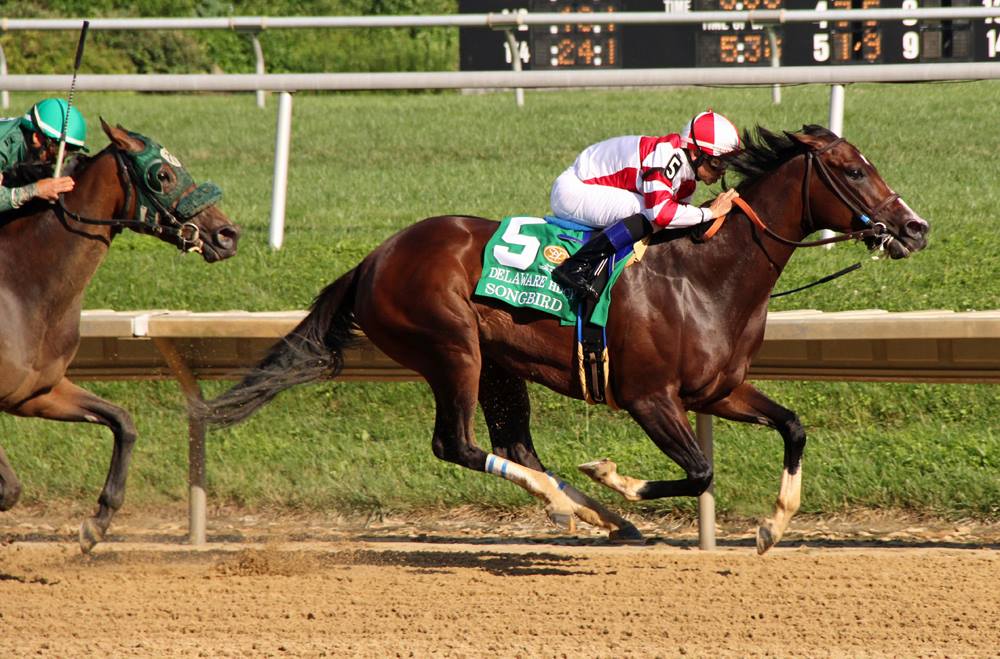
No longer did large crowds from up and down the east coast take the train to watch the races at Delaware Park. Handle and attendance dropped precipitously and Delaware Park closed following the 1982 racing season. The Delaware Handicap survived albeit in a new location: the race was run at Saratoga in 1983, 1984 and 1985.
Turning the Corner, Sort of…
In 1983, Delaware Park was purchased by the partnership of William Rickman and Billy Christmas. It reopened in 1984 sans The Delaware Handicap with a shortened meet and generally cheaper racing. One year later Mr. Rickman bought out his.
Rickman was a horse owner and racing fan, but he was also a good businessman. On the horizon he had a long-term plan to push the state legislature to introduce casino gambling at the track to make the facility more profitable and to help fund better racing via casino revenue. The Delaware Handicap returned to Delaware Park in 1986, but casino gambling was still nine years away. Meanwhile all the negative trends due to the increased competition for revenue continued making it a challenge to upgrade the racing. The race was downgraded to a Grade 2 event in 1990 and then further downgraded to a Grade 3 in 1996.
The Renaissance
Once the casino revenue enabled the track to increase purses, the race began to recapture its luster. In 2003 the race was upgraded to a Grade 2. In 2006 the winner was Fleet Indian, trained by Todd Pletcher and ridden by Jose Santos. She was good enough to run as the Breeders’ Cup Distaff favorite in the fall of that year.
In 2008 the purse was $1,000,000, and Hystericalady won the race for trainer Jerry Hollendorfer and jockey Garrett Gomez. In 2011 Hollendorfer and Gomez combined again with Blind Luck to nose out Harve de Grace. The two horses were arguably the best mares in the country at the time, and their thrilling battle in the DelCap was designated as “the race of the year” by the Daily Racing Form.
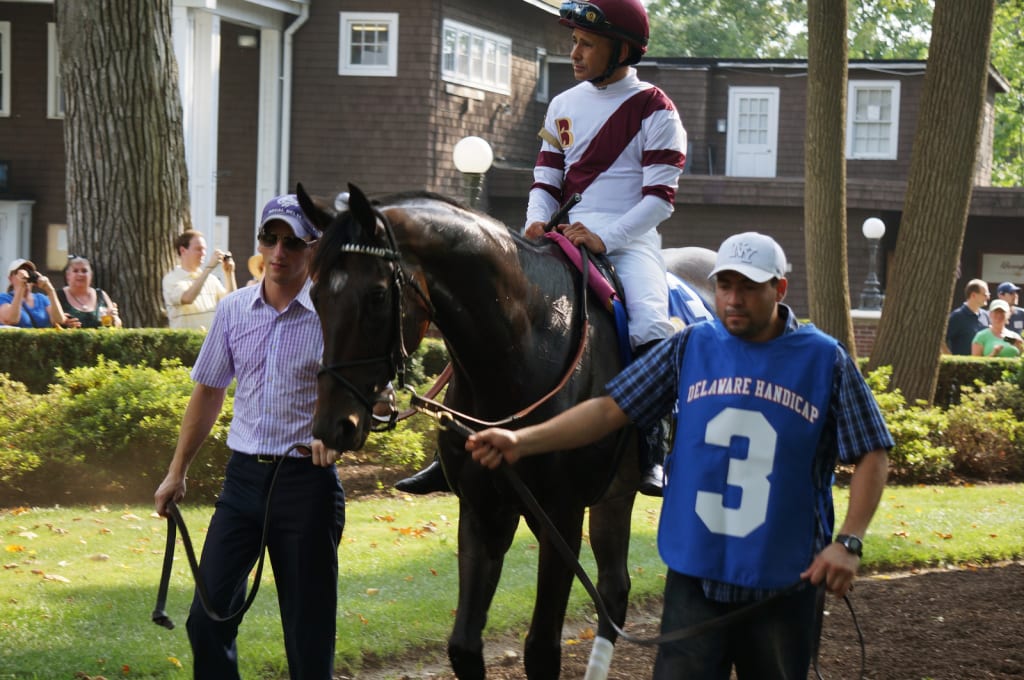
The next two years saw the great champion Royal Delta capture back to back wins in The Del Cap. Trained by Bill Mott and ridden by Mike Smith she also won the Eclipse Award for older female horse in both those years. In 2013 the race was once again designated as a Grade 1, and it seemed that the DelCap was once again one of the top races in the country.
Wrapping up
Recent years have seen stars like 2017 winner Songbird and Elate, who won the next two years. But it has also seen some short and relatively less accomplished fields, and in 2018, it slipped back down to Grade 2. In an effort to attract more horses in 2023 the race will be shortened to 1 3/16 miles with a purse of $500,000.
Through it all, there is no disputing the historical significance of the race thorough the years. Along with the aforementioned, Pletcher, Hollendorfer and Mott, winning trainers over the years include Chad Brown, Bobby Frankel, Billy Turner, D Wayne Lukas, Michael Dickinson, Laz Barrera, Angel Penna Sr., John Veitch, LeRoy Jolley, H. Allen Jerkins and Lucien Lauren.
Among the Hall of Fame horses to win the DelCap are Songbird, Royal Delta, Susan’s Girl, while jockey Angel Cordero, Jr. won four DelCaps, most of any rider. Three trainers – Pletcher, Mott, and Henry S. Clark – have won four DelCaps, also the most.
There has also been significant success for local connections. Regional barns that have captured the race include Fox Hill Farms (Songbird, 2017), Foxcatcher Farms (Parlo, 1955), Bohemia Stable (Politely, 1968 and Crowned, 1991), and Brandywine Stables (Everget, 1944 and Open Fire, 1996). Most fittingly Mrs. Jane Du Pont Lunger (Christiana Stables) captured the race in both 1958/59 with Endine and 1969/70 with Obeah. I like to think it would please Mr. William Du Pont Jr to see his family name alongside the other great champions of the signature race at his track.
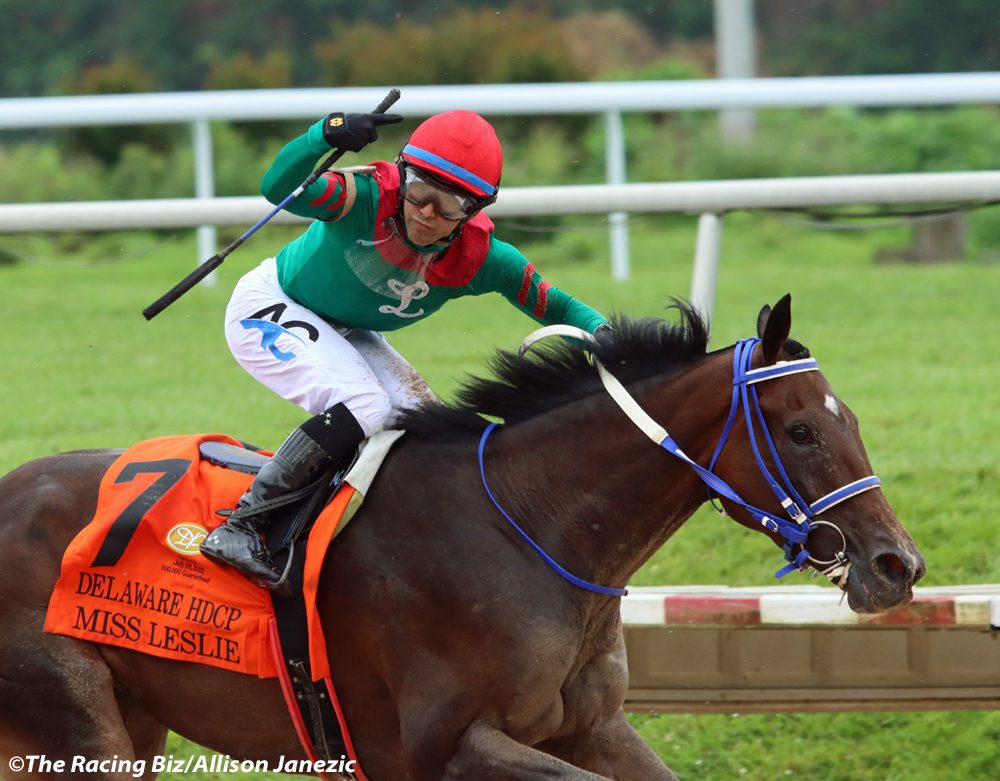
NEWS AND NOTES
At the end of the 2022 meet the top four jockeys in the rider standings at Delaware Park (Jaime Rodriguez, Mychel Sanchez, Carol Cedeno, and Angel Suarez) were cumulatively responsible for about 40% of the races won. As of July 1st of this year the top four jockeys in the standings (Rodriguez, Centeno, Cedeno, Gomez) only accounted for approximately 32% of the races won. Much of this decline relates to the 2022 champ, Jaime Rodriguez, splitting his time between Delaware and Laurel. Additionally, there are 16 jockeys that have four or more wins so far this year. Look for a real dogfight for the top 10 spots in 2023.
There is no disputing the consistency of trainer Michael Stidham from year-to-year and he is currently tied for fourth in the trainer standings with five wins, all on grass and only one as the favorite. His average win payoff exceeds $19 which is remarkably high for a trainer of his stature…
The card on June 28 was the first one of the year where there was a bias against both early speed and the rail. Only two horses wired their fields, and winners were able to circle and gain ground in middle paths. Extra points should be given to the two exceptions, Princely God and Mo Stylish, who won largely running on the front end, in the first path…
The eighth race on June 30th was a very evenly matched $16,000 N2L claimer. The odds of the eight entries ranged from a low of 2.70-1 to a high of 10.10-1. One of the entries, Unbridled Sass was very unsettled in the paddock. Although she had the number 5 saddle cloth, she came onto the track at the back of the post parade and then broke to the right as opposed to working out in front of the stands. She displayed very little run in the race. Next time out, be wary of betting her without first viewing her in the paddock and watching her warm up…
LATEST NEWS



